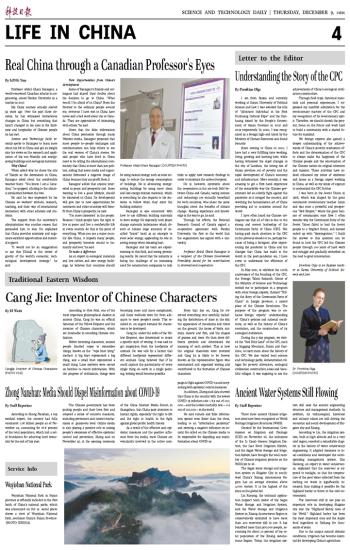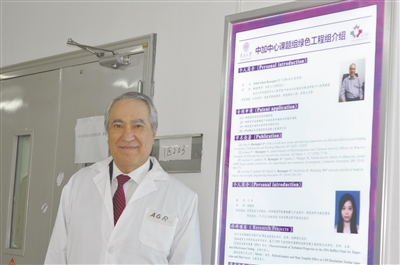
 |
| Professor Abdul Ghani Razaqpur. (COURTESY PHOTO) |
Professor Abdul Ghani Razaqpur, a world-renowned Canadian scholar in engineering, joined Nankai University as a teacher in 2017.
His China journey actually started 34 years ago. Over the past three decades, he has witnessed tremendous changes in China but something that hasn't changed in his eyes is the kindness and hospitality of Chinese people he has met.
Science and Technology Daily recently spoke to Razaqpur to learn more about his life in China and get an insight into his views on the research and application of the eco-friendly and energy-saving buildings and ecological materials.
Why China?
When asked why he chose the city of Tianjin as the destination in China, Razaqpur joked about the comfortable weather there. "You know, I am a Canadian," he quipped, alluding to the climatic similarities between the two.
He said he was impressed by his Chinese co-workers' attitude, research, teaching, and their way of international interaction with other scholars and students.
The support from the university's administration was another reason that persuaded him to stay. He explained that China provides scientists and engineers excellent opportunities and material support.
"It would not be an exaggeration to say this [China] is the center of gravity of the world's economic, technological development strategy," he said.
New Opportunities from China's development
Some of Razaqpur's friends and colleagues had shared their doubts about his decision to go to China. "What would I be afraid of in China? From the Premier to the ordinary people around me, everyone I have met in China have never said a bad word about me or Canada. They are appreciative of interacting with others,"he said.
Given that the false information about China permeates through many Western media, Razaqpur proposed that more people-to-people exchanges and communication can help others to see the real version of China's stories. He said people who have lived in China need to be telling the international community that China is more than just politics, adding that some media and organizations fabricated a negative image of China because they can profit from it.
Razaqpur added that anyone interested in peace and prosperity and those wanting to live a good lifestyle, should be interested in China. Its development will give rise to new opportunities for commerce and other countries will benefit from China's prosperity, he said.
"I'm more interested in the people. Because I think people have the right to live in peace and live a comfortable life in every country. So this is the point of everything. When you see a major country like China, it impacts many people, and prosperity becomes crucial to humanity and love,"he said.
To make a difference
As an expert in ecological materials and low carbon and zero energy buildings, he believes that countries should be using natural energy, such as solar energy, to reduce the energy consumption of buildings. He is advocating energy-saving buildings by using more clean and less energy-intense materials, which is something he also imparts to his students to follow when they enter the building industry.
Razaqpur is also concerned with how to use different building materials to store energy. He especially took phase change materials (substances which absorb or release large amounts of so-called "latent" heat) as an example to store solar energy, applauding its role in saving energy when releasing heat.
Razaqpur and his team are experimenting in this field, and seeing promising results. He noted that the industry is facing the challenge of an increasing need for construction companies to take risks to apply new research findings in order to minimize the carbon footprint.
He is, however, optimistic about the cooperation in the sci-tech field between China and Canada, saying science and technology are mutually beneficial for both countries, who share the same thoughts about the benefits of climate change. Sharing experience and knowledge is the way to go, he said.
Through his efforts, the National Research Council of Canada signed a cooperative agreement with Nankai University, the first in the world that the organization has signed with a university.
Professor Abdul Ghani Razaqpur is a recipient of the Chinese Government Friendship Award for his contributions to international cooperation.







